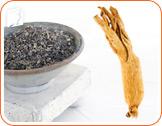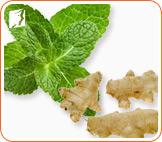Tea has been used for many years to treat menopause, and different types of teas can treat different symptoms. The abundance of herbs that exist to treat specific menopause symptoms means that it's easy to customize your tea.
How Can I Use Tea as a Remedy for Menopause?
Most herbs need only to be steeped in boiling water for a few minutes and can be taken more than once a day. In some cases, cooking with them is also a valid option. However, you should always remember to research them beforehand, as some teas should not be consumed in excess or if you are taking certain medications.
Black cohosh

This powerful herb is well known for its ability to treat the majority of menopause symptoms. It can be purchased as tea or tablets, and it's often recommended to help put an end to hormonal imbalances and fertility problems.
Ginseng
One of the oldest medical remedies around, ginseng is a traditional remedy throughout East Asia. This root, when taken as a tea, is an energizer, which makes it a wonderful cure for fatigue. It can also help fight the other symptoms of menopause.
Mint

Whether you're steeping wintergreen or peppermint, this tea is bound to give you more than fresh breath. Mint tea helps with cramps associated with PMS, along with other symptoms.
Ginger
This spice makes an excellent remedy for stomach problems. Another way to relieve period pains, it's also a common cure for nausea. It can be cooked in stir fries, desserts, drinks, and teas.
Basil
For headaches and sore joints, basil's the tea of choice. This herb has a pain-killing agent that eases aches and pains. Thyme has a similar effect, and both of these plants can be used as a seasoning on meat, part of a pasta sauce, or in tea.
More Information

Although tea is one remedy for menopausal symptoms, there are many others. If you're prone to hot flashes, other remedies may work better, as hot drinks can be a trigger for hot flashes and night sweats. No matter what variety of tea you're drinking, always check to make sure it is caffeine-free, as caffeine may worsen some symptoms.
Teas can be a great way to soothe menopause symptoms, but most do not address the underlying hormonal imbalance. Click here to learn more about menopause treatments.
Sources
- BMJ Group. "Menopause: What is it?" Patient Leaflet. 2007.
- Hopkins, Virginia. Lee, John R. M.D. What Your Doctor May Not Tell You About Menopause. New York: Warner Books Inc., 1996.
- Love, Susan M.D. Menopause and Hormone Book. New York: Three Rivers Press, 2003.
- Martin, Raquel. The Estrogen Alternative. Rochester, VT: Healing Arts Press, 2000.



